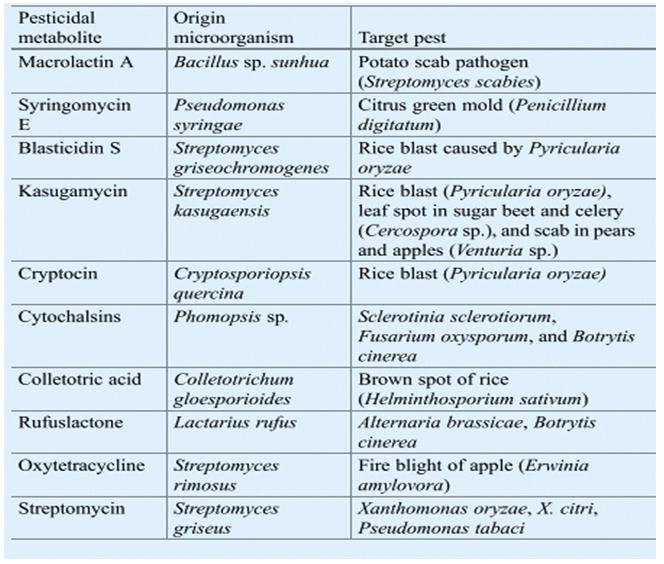Lifeasible focuses on applying natural metabolites in plant protection and provides research services on microbial metabolites in plant protection to contribute to the application of microbial metabolites in plant protection.
Biological control of plant pests and diseases through microbial metabolites is an environmentally friendly and effective means of plant protection. Microbial metabolites play an essential role in plant protection. Microbial metabolites can be used for plant pest control. Entomopathogenic bacteria, fungi, and nematodes can produce a variety of insecticidal substances, including cry toxins, thuringiensin, binary toxins, destruxins, and oosporeins. Microbial metabolites can also be used for plant pathogen control. Substances produced by plant endophytes and rhizosphere microorganisms have anti-phytopathogenic and plant immunomodulatory functions. In addition, microbial metabolites can be used for weed control. For example, hydantocidin, vulgamycin, herboxidiene, and cornexistin are herbicidal microbial metabolites.
 Fig. 1 Microbial metabolites produced by different microorganisms with fungicidal and antibiotic action against different diseases (Subbanna et al., 2020).
Fig. 1 Microbial metabolites produced by different microorganisms with fungicidal and antibiotic action against different diseases (Subbanna et al., 2020).
Discovery of microbial metabolites with plant protection function
We offer services for the discovery of anti-insect substances from known entomopathogenic microorganisms. We approach the discovery of anti-insect substances in two directions. One is to isolate and purify small molecule metabolites of entomopathogenic microorganisms and explore whether these small molecules have insecticidal activity through insecticidal experiments. The other is to explore whether specific proteins and peptides produced by pathogenic microorganisms have insecticidal activity. Then, we also provide services to discover anti-phytopathogenic microbial substances from microorganisms known to have anti-phytopathogenic microorganisms. We help discover and verify anti-phytopathogenic microbial substances through inhibition experiments. If there is a demand to discover microbial metabolites with herbicidal functions, we can also provide that.
Research on the plant protection mechanism of microbial metabolites
We offer research services on plant protection mechanisms of microbial metabolites, including anti-microbial, anti-insect, and herbicidal mechanisms. Please click to see the details.
Synthesis of microbial metabolites
We provide synthesis design services for microbial metabolites, including chemical synthesis design and biosynthesis design. We also provide synthesis optimization services for microbial metabolites.
Optimization of plant protection functions of microbial metabolites
For microbial metabolites found to have plant-protective effects, we offer plant-protective effect optimization services. We optimize metabolites based on their properties. For small molecule metabolites, we optimize them by various chemical methods. For protein and peptide substances, we optimize them mostly by biological methods.
Assessment of the development value of microbial metabolites
We offer various experimental services to help evaluate the developmental value of microbial metabolites, including thermal stability assessment experiments, degradation experiments, difficulty assessment of metabolite synthesis, toxicity experiments on other organisms, and plant expression experiments of microbial metabolites.
Lifeasible provides comprehensive services for developing microbial metabolites for plant protection, including microbial metabolite discovery, plant protection mechanism research, microbial metabolite optimization, and microbial metabolite development value assessment. Please contact us for these services.
References